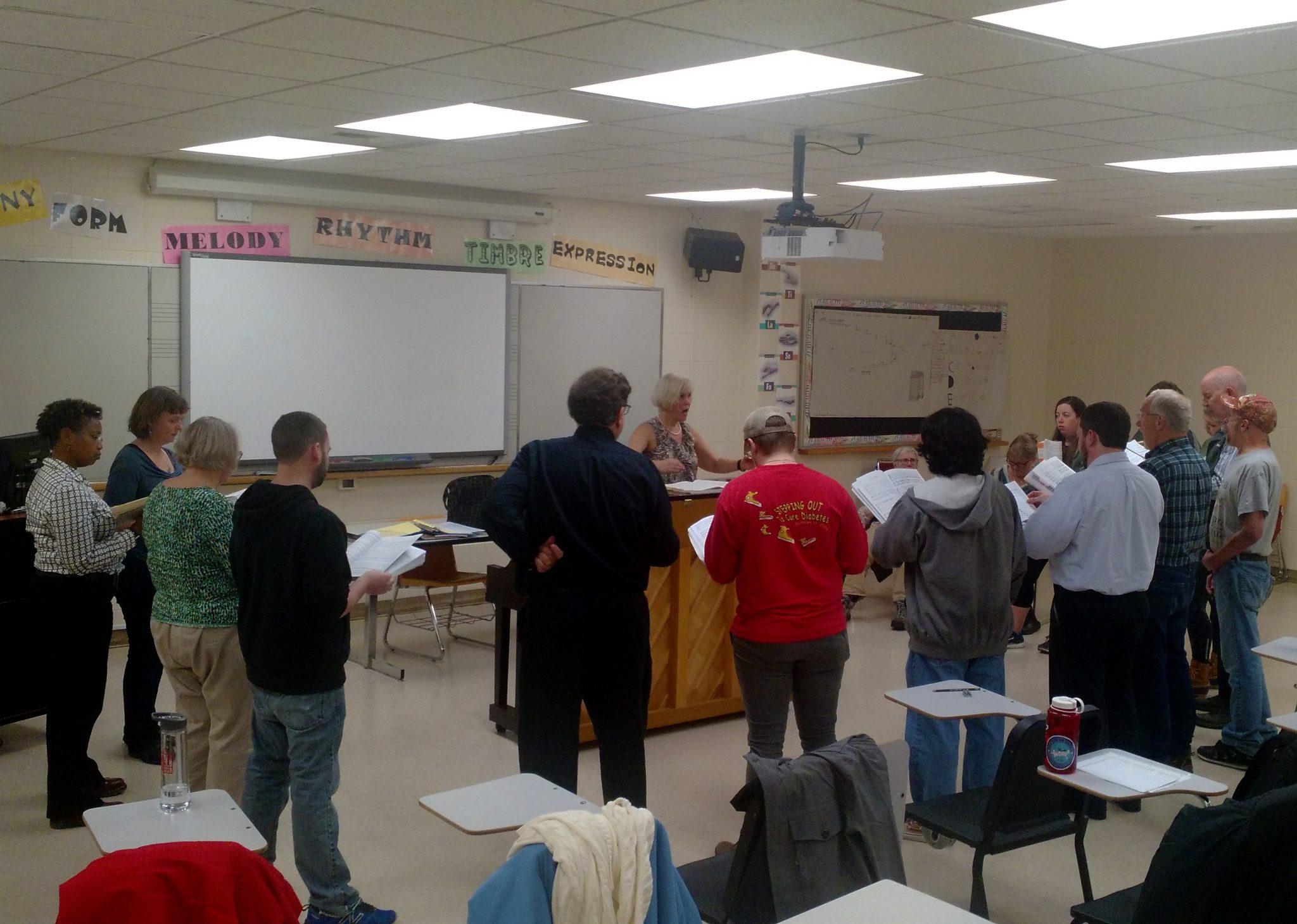Uncommon, though not unique, the Appalachian Chorale brings together students and the Boone community.
While it fulfills an ensemble requirement for students, only 40 of the 108 members are registered for the class. The rest of the choir is community members ranging from unregistered students, alumni, faculty and Boone residents.
The group practices together each spring and fall semester to sing for its end-of-semester concert. Linda Larson, the choir’s conductor, considers the variety of skills and backgrounds to be the strength of the choir.
Because there are no auditions for the chorale, people have varying experiences in choirs. Larson asks less experienced singers to take a leap of faith. She does not pace rehearsals for the least experienced member.
Conducting a choir with such differences can be a challenge, Larson said. However, each singer has their strengths and weaknesses. The phrases and notes that a singer can do well contribute to the sound of the choir.
“Nobody is responsible for every note,” Larson said. “We have a collective responsibility.”
Larson takes time to engage with her singers. She teaches them proper vocal techniques and styles along with the concert pieces.
“I took individual voice lessons for several years,” Joe Lowman, a community member, said. “Much of what Dr. Larson teaches us about good singing is the same as I was exposed to in individual study.”
Larson challenges the choir with the songs she chooses. She aims to find variety that will interest and engage the singers and the audience.
The mission of the choir is to sing the choral masterworks. Each concert has a feature item, which can range from 15 to 40 minutes. The rest of the hour-long concert is filled in with smaller pieces.
“This is a place to get different music, to get a pretty serious level of music,” Larson said. “I try not to do only dead, white, European males.”
By coincidence, this semester’s feature piece is part one of Handel’s “Messiah.”
Many choirs sing “Messiah” every year at Christmas, particularly in churches. Larson said the piece is not overrated. It is difficult to sing despite its popularity.
Larson purposefully made her interpretation different than the typical interpretation. A small group will be singing parts of “Messiah” as part of this interpretation. The small groups consists of 20 singers from the choir who auditioned. They were chosen for their vocal skills and ability to learn notes on their own.
“The rest of the chorale and our audience will be impressed by the high quality of our performance,” Lowman said. “I have sung in small select groups before and know what is both required and possible. Linda has brought our small group along in a remarkably short number of weeks through 30-minute rehearsals after our main rehearsal.”
Larson also encourages each f the members to really pay attention to what they are singing.
“A lot of folks are familiar with Handel’s ‘Messiah,’” Ralph Seamon, a community member, said. “Linda’s actually able to push us a lot harder on this because we know the parts, so she’s able to bring a lot more out of us.”
Abby Betinis’ caroling piece “Come In, Come In” will begin the concert as a welcoming piece. It is sung as a round, a melody that is started at different times and sung together.
Traditionally going last in the concert, Larson made Mozart’s “Ave Verum Corpus” the second piece. Larson started this tradition as a way of acknowledging older choir members and inviting them to sing.
Larson wanted to keep the piece last, but felt that the “Hallelujah Chorus” was much more fitting to end the concert.
Although the spring semester concert isn’t until April 30, Larson already has her feature piece picked out.
The chorale will sing Donald McCullough’s “Holocaust Cantata” at the concert less than a week before Yom Hashoah, Holocaust Remembrance Day, on May 2.
The 40-minute cantata was inspired by music sung by inmates in the concentration camps during the Holocaust. The movements are inspired by the melodies McCullough found in the archives of the United States Holocaust Memorial Museum in Washington, D.C.
The cantata will have a mix of choir, solos and spoken word.
Larson will coordinate with the Center for Judaic, Holocaust, and Peace Studies.
The concert is free and will be held Dec. 4 at 8 p.m. in the Rosen Concert Hall.
Story and photo by Nyctea Martell, A&E Reporter
Featured photo caption: Larson conducts the small group as the practice a chorus from “Messiah”. The singers are expected to learn the notes and home and prepare for rehearsal to focus on polishing the piece.

